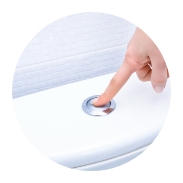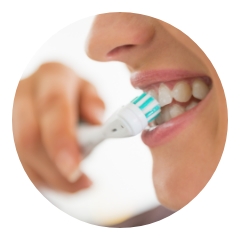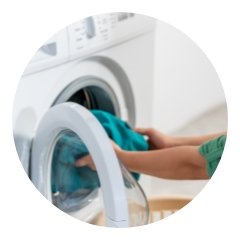
How many ways can you save water in your home?
Showers versus bathsWe use around 68% of water at home in the bathroom - in the bath, at the sink, flushing toilets and in the shower. There are plenty of ways to save water in this room.
|
 |
 |
|
ToiletsFlush wisely Ever wondered what the difference is between the buttons on a dual flush? They're there to give you the choice of how much water to use.
Install a Cistern Displacement Device (CDD) or toilet buffaloo Have you got an old-style flush that's using a lot of water? A Cistern Displacement Device may just be the free device you need. You'll save lots of water with very little effort. They're easy to install, and you don't have to change your routine.
Fix leaky loos quick Did you realise that a leaky loo wastes between 200 and 400 litres of water per day? That’s a jaw-dropping 72,000 to 148,000 litres of water wasted every year, just from one leaking toilet. |
 |
 |
|
Taps:Taps are another touchpoint where you can save water with ordinary steps.Keeping a tap running uses around 6 litres per minute.
|
 |
 |
|
Dishwasher versus hand-washing dishes:Is using a dishwasher more water-efficient than washing the dishes by hand? Yes. But under these conditons:
If having a dishwasher isn't an option for you, don't worry, there are other oridnary steps you can take to help save water while doing the washing up.
|
 |
 |
|
Washing clothes:Washing machines can be main water guzzlers at home. There are a couple of things you can do to help keep them running as efficiently as possible.
|
 |
 |
|
Drinking and cooking:Saving water is important, but remember to drink enough of it too! The average human should be drinking at least 2 to 3 litres of water a day.
Extra tip: plants love to have a drink of any leftover water in glasses, kettles and saucepans (as long as it's not still hot!). |
 |
